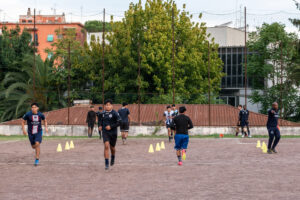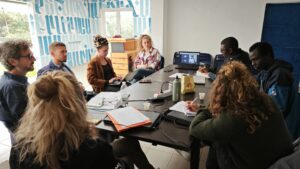[:it]
Sono le 07.35. Generalmente sono appena salita sulla metro, un orario di punta, un orario affollato di persone che si spostano da un luogo all’altro di Roma.
Ascolto spesso le conversazioni degli studenti, chi è in ritardo, chi non ha studiato, chi è innamorato, chi entra in seconda, chi si sente abbastanza preparato per il compito in classe, chi non ha preparato la ricerca perché Netflix/playstation/calcetto, chi ha preso già troppe note e preferirebbe fare qualsiasi altra cosa piuttosto che andare a scuola. Sorrido quasi sempre pensando alla prima volta che feci sega (o marinai la scuola, per i lettori extraromani), anche se il carattere della maestrina torna subito prepotentemente e se fossi una docente della scuola dell’obbligo userei a tal punto la penna rossa e il registro di classe da finire rinchiusa nello sgabuzzino delle scope alla prima occasione, vittima di atroci angherie.
La buona notizia è che non sono una docente della scuola dell’obbligo.
L’altra notizia è che senza scuola non sarei saputa stare. Che nella formazione ci credo parecchio, ma ancora di più credo nell’insegnamento reciproco, nella condivisione di saperi, nella conoscenza come bene collettivo, che l’intelligenza di un singolo ha senso solo se messa in relazione con le capacità degli altri.
Un po’ come la storia della felicità che è reale solo se condivisa.
Insegnare italiano agli studenti stranieri, diventare una docente di L2/Ls mi è quindi parsa una buona idea, una di quelle idee che improvvisamente ti allargano la vita.
Perché tra gli studenti di varie lingue e nazionalità ai quali avrei potuto insegnare ho scelto quel settore particolarissimo degli studenti migranti che transitano nel nostro Paese per qualche anno, qualche mese, oppure che scelgono l’Italia come meta finale di un viaggio iniziato lontano. Lontano come il Corno d’Africa, lontano come la Siria, lontano come il Kurdistan, lontano come il Venezuela. Che io a sentire loro mi sento sempre così poco cosmopolita, con la mia vita ben radicata su Roma, mentre gli studenti della scuola di italiano hanno attraverso continenti. Mi sento sempre così poco coraggiosa, con le mie preoccupazioni quotidiane – la spesa, le scadenze a lavoro, il traffico romano – mentre gli studenti della scuola di italiano raccontano della loro notte più scura, quella della fuga, o quella delle violenze, o quella della perdita di tutto, della scomparsa della famiglia, della solitudine e del silenzio. Che poi non è che hanno tutta questa voglia di raccontare, forse perché hanno capito che i loro racconti non trovano le parole, nella nostra lingua, per trasmettere l’altrui sofferenza. O forse perché sono stanchi di esser narrati da altri. È la loro storia e vorrebbero trovare le parole per dirsi. Alcuni di loro vengono a scuola anche per questo, per dire “sono qui e voglio farti sentire il mondo quanto è grande”.
Non tutti: molti vorrebbero anche solo parlare un po’ di italiano per trovare lavoro e condurre una vita dignitosa. Per alzarsi la mattina come molti romani alle 07.00, prendere la metro alle 07.30 e incontrare gli altri studenti o lavoratori che stanno iniziando la loro giornata. Fare, vorrebbero tanto fare.
Fossi stata imprenditrice allora avrei provato a veder di lavorare insieme. Ma invece sono una docente, costruisco con le parole, senza mattoni.
Da quelle iniziamo per costruire nuovi destini, ognuno cercando le parole per dirsi.
Martina Volpe
[:en]
It’s 7.35am. Usually, I have just boarded the underground. It’s rush hour, a time when a huge crowd of people moves from one part of Rome to another.
I often listen to the students’ conversations – who is late, who hasn’t done their homework, who’s in love, who is skipping the first class, who feels properly prepared for class activities, who has not done their research because of Netflix/Playstation/five-a-side, who has been in trouble too many times and would rather do just about anything else rather than go to school.
I smile every time, thinking about the first time I bunked school, even if the character of the teacher comes powerfully back and if I was a professor in compulsory education I would use the red pen and the class register to end up closed in the broom cupboard at the first opportunity, the victim of terrible vexations. The good news is that I am not a teacher in a compulsory education school.
The other news is that without school I wouldn’t have known how to be. That I believe strongly in education, but I believe even more in reciprocal teaching, in the sharing of knowledge, in knowledge as a collective good, that the intelligence of the individual only has a sense in relation to the abilities of the others. A bit like the story of how happines is only real if it shared.
Teaching Italian to foreign students, becoming a teacher of L2/Ls seemed to me like a good idea, one of those ideas which suddenly broadens your horizons. Because among the students of various languages and nationalities that I could have taught I chose that particular sector of migrant students that pass through our country for a few years, a few months, or that choose Italy as the final destination of a journey that started far away. As far away as the Horn of Africa, as far as Syria, as Kurdistan, or Venezuela.
Listening to them I feel so uncosmpoplitan, with my life so deeply rooted in Rome, while the Italian school students have crossed continents. I feel so un uncourageous, with my daily worries – shopping, work deadlines, the Roman traffic – while the students of the Italian school tell of their dark nights, of fleeing, of violence, or of losing everything, the disappearance of their family, of loneliness and of silence.
And it is not that they have a great wish to tell, because perhaps they have understood that there are no adequate words in our language to tell the the story of the suffering of others. Or maybe they are tired of having their story told by others. It is their story and they want to find the words to tell it. Some of them come to school for this reason too, to be able to say “I am here and I want to tell you how big the world is”.
Not all of them, but many want to speak a little Italian to find work and lead a dignified life. To get up every morning like many Romans at 7am, to get the underground at 7.30am and to meet other students and works who are beginning their day. To do, they want so much to do.
If I was a businesswoman I would have tried to see how we could work together. But instead I am a teacher. I build with words, not bricks. From these we begin to build new destinies, each one searching for the right words.
Martina Volpe
[:]



